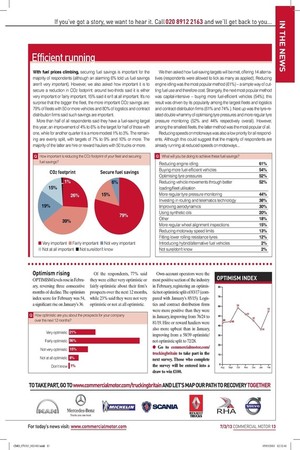With fuel prices climbing, securing fuel savings is important for
Page 9

If you've noticed an error in this article please click here to report it so we can fix it.
the majority of respondents (although an alarming 6% told us fuel savings aren't very important). However, we also asked how important it is to secure a reduction in CO2 footprint: around two-thirds said it is either very important or fairly important; 15% said it isn't at all important. It's no surprise that the bigger the fleet, the more important CO2 savings are: 79% of fleets with 50 or more vehicles and 80% of logistics and contract distribution firms said such savings are important.
More than half of all respondents said they have a fuel-saving target this year; an improvement of 4% to 6% is the target for half of those with one, while for another quarter it is a more modest 1% to 3%. The remaining are evenly split, with targets of 7% to 9% and 10% or more. The majority of the latter are hire or reward hauliers with 50 trucks or more. We then asked how fuel-saving targets will be met, offering 14 alternatives (respondents were allowed to tick as many as applied). Reducing engine idling was the most popular method (61%) — a simple way of cutting fuel use and therefore cost. Strangely, the next most popular method was capital-intensive — buying more fuel-efficient vehicles (54%); this result was driven by its popularity among the largest fleets and logistics and contract distribution firms (61% and 74%). Next up was the tyre-related double whammy of optimising tyre pressures and more regular tyre pressure monitoring (52% and 44% respectively overall). However, among the smallest fleets, the latter method was the most popular of all.
Reducing speeds on motorways was also a low priority for all respondents. Although this could suggest that the majority of respondents are already running at reduced speeds on motorways...
What will you be doing to achieve these fuel savings?
Reducing engine idling 61% Buying more fuel-efficient vehicles 54% Optimising tyre pressures 52% Reducing vehicle movements through better loading/fleet utilisation 52% More regular tyre pressure monitoring 44% Investing in routing and telematics technology 38% Improving aerodynamics 30% Using synthetic oils 20% Other 18% More regular wheel alignment inspections 15% Reducing motorway speed limits 13% Fitting lower rolling resistance tyres 12% Introducing hybrid/alternative fuel vehicles 2% Not sure/don't know 2%







































